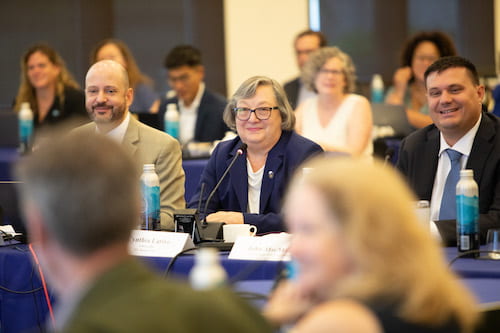UC Santa Cruz Chancellor Cynthia Larive and other campus leaders showcased the university’s innovation and entrepreneurship initiatives to a group of UC regents and external advisors on Monday, August 28. During the daylong on-campus meeting of the UC Regents Special Committee on Innovation Transfer and Entrepreneurship, UC Santa Cruz had the opportunity to highlight its role as an engine of innovation and economic activity.
“The entrepreneurial spirit runs deep at UC Santa Cruz, and it was great to have the opportunity to share our unique approach,” said Larive, noting that university faculty, students, staff, and alumni have long been at the forefront of major research advances and cultural movements. “Our history in innovation, from sequencing the human genome to pioneering the global shift toward organic farming, is extremely impressive for such a young institution, and what we are doing now and where we are heading is equally impressive.”
The Special Committee also heard from members of the campus community via public comments about the impact UC Santa Cruz programs and resources have had on their innovation-transfer efforts.
Biomolecular Engineering Professor Ed Green spoke about his experience launching three biotech companies — Dovetail Genomics, Astrea Forensics and Claret Bioscience — all of which utilize UC-patented technology, and “all of which are still going strong.” He noted that the ability to launch spinoff companies has been game-changing for the students coming out of his lab, allowing them to stay in Santa Cruz and to help build the growing community of biotechnology companies.
Cameron Pye, a former UC Santa Cruz graduate student and co-founder of Unnatural Products, another Santa Cruz biotech company, said the initiatives underway on campus to establish a better support system for those looking to spin off companies that draw on campus-generated innovations have the ability to create a “best-in-class ecosystem here in Santa Cruz.” The company he and co-founder Joshua Schwochert, also a former UC Santa Cruz graduate student, started in 2017 now employs 24, many of them Banana Slugs, Pye said.
Later in the day, Computational Media Professor Sri Kurniawan, whose research focuses on the design of interactive systems that help people with special needs, inspired the audience with examples of her group’s impactful work and described her experience in innovation transfer with both industry and nonprofits.
The day ended with a special innovation showcase at the Westside Research Park, the off-campus research center on Delaware Avenue managed by the Baskin School of Engineering. Attendees had the opportunity to visit and engage with the Genomics Institute and learn about projects being advanced through the Lederman Lab in the Physics Department and Hybrid Systems Lab in the Electrical and Computer Engineering Department. Among those on hand to answer questions was Kelly Harkins Kincaid, founding CEO of Astrea and co-founder of Claret. The former postdoctoral researcher in the UC Santa Cruz Paleogenomics Lab co-founded the companies with Green. She now serves on UC President Michael Drake’s new Entrepreneurship Network Council to support entrepreneurial activity, from invention to commercialization, across the University’s 10 campuses.
Regents came away impressed. Regent Ana Matosantos said she was pleased with the approach campus leaders are taking with innovation and entrepreneurship efforts, focusing on the unique role Santa Cruz can play in biotechnology, “and how Santa Cruz and your capabilities can lift up the region.”
The Special Committee on Innovation Transfer and Entrepreneurship was established in 2021. It was charged with optimizing the way the University of California and its campuses promote innovation transfer and entrepreneurship, and translate their discoveries into products, services, and innovations having societal impact. On Monday, three Regents were in attendance — Regent Chair Richard Lieb, Jose M. Hernandez, and Matosantos — as was a group of external advisors and chancellors serving on the committee.
Joining the chancellor for her presentation were Vice Chancellor for Research John MacMillan, Assistant Vice Chancellor for Innovation and Business Engagement Ryan Sharp, and Larry Samuels, who is supporting innovation initiatives at UCSC’s Monterey Bay Education, Science and Technology Center in Marina, known as MBEST.
Campus research impact on the rise
The university’s research impact has been on a strong upward trajectory, with a roughly 63 percent increase in extramural funding over the past five years, reaching over $203 million last year. The campus innovation portfolio now includes more than 350 U.S. patents under management.
The campus in 2019 set out to develop a shared vision and framework for innovation and entrepreneurship activities, and two years later launched the Innovation & Business Engagement Hub to advance innovation and entrepreneurship programs, facilitate expanded industry partnerships, and engage in innovation-led economic development initiatives. Organized as a partnership between the UC Santa Cruz Office of Research and University Relations division, the Hub represents a creative approach by campus units to pool staff resources and expertise to advance the collective work of the university. The Hub acts as the point of entry for industry partners, investors, and entrepreneurs to connect with the university’s discoveries, innovations, resources, and talent.
In recent years, UC Santa Cruz has made significant progress on several programs and initiatives to advance innovation and entrepreneurship, and to further encourage a campus culture that recognizes the value of innovation, and fosters an opportunities-centered mindset around translational research, commercialization, and partnering.
An example is the Chancellor’s Innovation Impact Awards Program, held for the first time earlier this year. It recognizes and celebrates university faculty, researchers, staff, students, and community partners for their valuable contributions to innovations that have catalyzed transformative change and societal impact. Another program — the Innovation Catalyst Grant — focuses on providing targeted gap funding, training, mentorship, and support to UC Santa Cruz researchers advancing early-stage technology innovations.
The Hub is also working to build a supportive innovation ecosystem. What has become known as the Innovation Champions Network provides those on campus involved in entrepreneurship efforts with a forum for information sharing, strategic planning, and special initiatives coordination. The network includes members from several long-standing campus organizations including the Center for Innovation & Entrepreneurial Development (CIED), student organizations like Student Creativity Empowerment and Entrepreneurship (SCEE), and the university’s two Institutes for Science and Innovation, QB3 and the Center for Information Technology Research in the Interest of Society (CITRIS).
“I am proud of the work the Hub team and our campus partners have done to build a coordinated innovation ecosystem,” said Assistant Vice Chancellor Sharp. “Effectively leveraging our resources and aligning our efforts, we can fill gaps and address the unique needs of our innovators.”
The path to expanded innovation transfer
Campus leaders discussed ways to enhance innovation transfer and entrepreneurship activities. They voiced support for a partially decentralized approach that would allow UC to continue to provide back-office support and specialized services, and the creation of a systemwide proof-of-concept fund to help finance promising innovations. Freeing up staff time by eliminating inefficiencies created by antiquated centralized software tools, such as the one used by many campuses to track patents, was also a topic of conversation, and campus leaders backed a recommendation made at the systemwide level to revise promotion and tenure guidelines to include consideration of innovation and entrepreneurship.
“UC Santa Cruz has an unparalleled opportunity to broaden impact around our established and emerging areas of research excellence, crossing domains of human and planetary health, drawing on computer science and engineering synergies, and leveraging our strengths in social justice and community engagement,” said MacMillan, who heads the campus Office of Research.
In the short and moderate term, campus leaders said, UC Santa Cruz is well-positioned to accelerate innovation activity in two areas — climate action and advanced aviation.
In terms of climate action, UC Santa Cruz has seen early success with its recently launched Center for Coastal Climate Resilience, and the university is looking to increase this momentum through the continued build-out of the Hub’s Climate Action Solutions Catalyst program, funded through the UC Climate Action Innovation and Entrepreneurship Awards. The program aims to advance the development and adoption of solutions addressing California’s most pressing climate challenges.
In advanced aviation, campus has an opportunity to build on its leadership in existing aviation and drone initiatives to boost regional economic growth by fully activating MBEST. The center is on part of the land UC received from the U.S. Army in 1994 when Fort Ord was closed. It is adjacent to the Marina airport, which currently houses a facility run by Joby Aviation, one of the world’s leading fully-integrated eVTOL aircraft companies. The surrounding region is also home to other prominent advanced aviation companies. This industry cluster is reflected in ongoing economic development initiatives.

